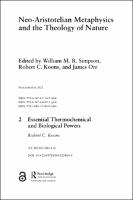Chapter 2 Essential Thermochemical and Biological Powers
Proposal review
| dc.contributor.author | Koons, Robert C. | |
| dc.date.accessioned | 2021-10-07T12:38:57Z | |
| dc.date.available | 2021-10-07T12:38:57Z | |
| dc.date.issued | 2022 | |
| dc.identifier.uri | https://library.oapen.org/handle/20.500.12657/50864 | |
| dc.description.abstract | "There are three great options in the philosophy of nature: materialism, cosmic monism, and holistic pluralism. These correspond to the metaphysical priority of, respectively, the very small, the very large, and the intermediate. Human beings and other organisms fall into the intermediate category, and a philosophy of nature that gives pride of place to thought and responsible, intentional action, while avoiding Cartesian dualism and idealism, must embrace the Aristotelian option of plural holism. Aristotle’s metaphysics clearly assigns the status of fundamental to living organisms, despite their intermediate size. However, integrating this Aristotelian view with modern science faces the problem of the inorganic world. Where can we find the fundamental Aristotelian substances in that world, needed to complete the plural holist picture? I will argue that we can take our cues from the holistic character of quantum chemistry and thermodynamics. Just as there are irreducibly human powers grounded in the human soul as the ‘form of the body’, so too are there irreducibly thermochemical powers grounded in thermochemical forms, which are ontologically prior to the arrangement of particles and waves in space and time. I extend this account to the irreducibly biological powers of organisms." | en_US |
| dc.language | English | en_US |
| dc.subject.classification | thema EDItEUR::Q Philosophy and Religion::QD Philosophy | en_US |
| dc.subject.classification | thema EDItEUR::Q Philosophy and Religion::QD Philosophy::QDT Topics in philosophy::QDTJ Philosophy: metaphysics and ontology | en_US |
| dc.subject.classification | thema EDItEUR::Q Philosophy and Religion::QR Religion and beliefs::QRA Religion: general::QRAB Philosophy of religion | en_US |
| dc.subject.other | Philosophy, metaphysics, philosophy of religion, philosophy of mind, philosophy of science, religion and philosophy, religion and science, christian theology | en_US |
| dc.title | Chapter 2 Essential Thermochemical and Biological Powers | en_US |
| dc.type | chapter | |
| oapen.identifier.doi | 10.4324/9781003125860-4 | en_US |
| oapen.relation.isPublishedBy | 7b3c7b10-5b1e-40b3-860e-c6dd5197f0bb | en_US |
| oapen.relation.isPartOfBook | c68a71d7-d439-455c-9cd2-42a748157fd0 | en_US |
| oapen.relation.isbn | 9780367637149 | en_US |
| oapen.relation.isbn | 9780367646981 | en_US |
| oapen.imprint | Routledge | en_US |
| oapen.pages | 29 | en_US |
| peerreview.anonymity | Single-anonymised | |
| peerreview.id | bc80075c-96cc-4740-a9f3-a234bc2598f1 | |
| peerreview.open.review | No | |
| peerreview.publish.responsibility | Publisher | |
| peerreview.review.stage | Pre-publication | |
| peerreview.review.type | Proposal | |
| peerreview.reviewer.type | Internal editor | |
| peerreview.reviewer.type | External peer reviewer | |
| peerreview.title | Proposal review | |
| oapen.review.comments | Taylor & Francis open access titles are reviewed as a minimum at proposal stage by at least two external peer reviewers and an internal editor (additional reviews may be sought and additional content reviewed as required). |

